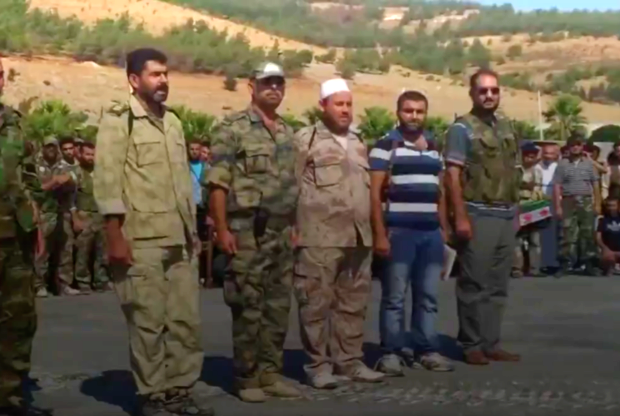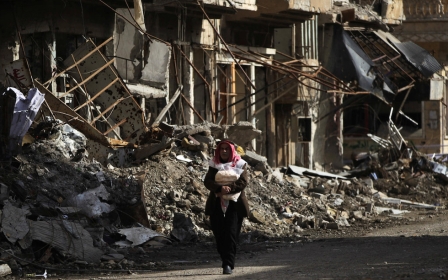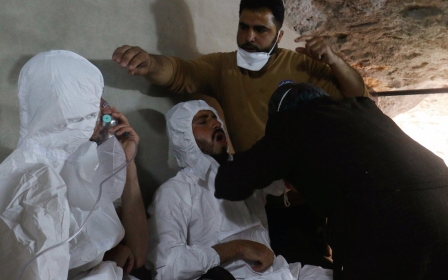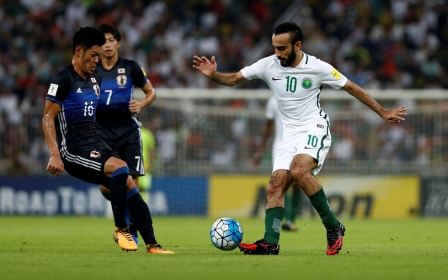Syrian rebels meet in Qatar after declaring unified 'national army'

Syrian opposition delegates were in Doha on Thursday to meet with the Qatari foreign minister, following the creation of a "unified" rebel army in Syria.
Nizar Hiraki, the Syrian opposition's ambassador to Qatar, said the visit to the Gulf state was part of a diplomatic offensive with sympathetic nations ahead of the upcoming UN General Assembly meeting in New York later in September.
The creation of the United National Army, which reportedly has the support of 44 Syrian rebel groups, was mandated by the Turkey-based Syrian Interim Government (SIG) and is set to be headed by SIG Prime Minister Jawad Abu Hatab.
It came following a meeting on Monday between the SIG and the fractured Syrian rebel groups. The meeting also discussed internal reform of the Syrian National Coalition (SNC) and the need for a unified political authority under the Higher Negotiations Committee (HNC).
The leader of one rebel faction in Daraa welcomed the news of the creation of a national army as means of solidifying the position of the rebel factions.
"The revolution at this phase is in urgent need of military unity and unification of the ranks and stands to support the political position of the revolution in meetings and international talks on Syria," Khaled al-Faraj Abu Oday told the Qasion news site on Tuesday.
"The Syrian battlefield is currently in a very sensitive stage, and if we remain dispersed, we will not be able to achieve the aspirations of the Syrian people to live in dignity and freedom and bring down the Assad regime with all its symbols."
The Syrian opposition has been severely weakened in the last year - the fall of Aleppo to Bashar al-Assad's forces and the seizing of power in Idlib by the former al-Qaeda affiliate, Hayat Tahrir al-Sham (HTS), has left prospect for military success looking bleak.
Among the groups reportedly taking part in the new rebel forces coalition are Ahrar al-Sham, which was driven out of Idlib by HTS, and Jaish al-Islam, which controlled the besieged district of East Ghouta in Damascus.
The announcement of the new army also comes on the heels of critical comments from the UN's Syria mediator about the HNC's hardline stance against the Assad government.
"The only answer is a political process," Staffan de Mistura, who has led sputtering UN-backed peace talks, told reporters in Geneva on Wednesday.
In the run up to the next round of negotiations, tentatively scheduled to take place in the Swiss city next month, de Mistura has pushed the opposition to form a single delegation that can meet face-to-face with the Damascus government.
"Will the opposition be able to be unified and realistic enough to realise they didn't win the war?" de Mistura said.
The main opposition camp, the Saudi-backed High Negotiations Committee (HNC), has insisted that Assad must leave office as part of any peace deal.
That hardline stance has put the HNC at odds with two more moderate opposition groups, known as the Moscow and Cairo platforms.
De Mistura has in recent weeks upped the pressure on the groups to unite and said he believed they would be meeting again in Riyadh in the coming weeks, after talks there last month failed to produce a compromise.
With Islamic State militants facing possibly imminent defeat in the key Syrian locations of Deir Ezzor and Raqqa, de Mistura raised the prospect of hosting negotiations with Syria relatively free of active fighting.
That would also require an urgently needed "national ceasefire" between the government and various rebels groups, he said.
The UN has helped broker multiple previous truces during the war that has claimed more than 330,000 lives since 2011, but none have proved lasting.
New MEE newsletter: Jerusalem Dispatch
Sign up to get the latest insights and analysis on Israel-Palestine, alongside Turkey Unpacked and other MEE newsletters
Middle East Eye delivers independent and unrivalled coverage and analysis of the Middle East, North Africa and beyond. To learn more about republishing this content and the associated fees, please fill out this form. More about MEE can be found here.




